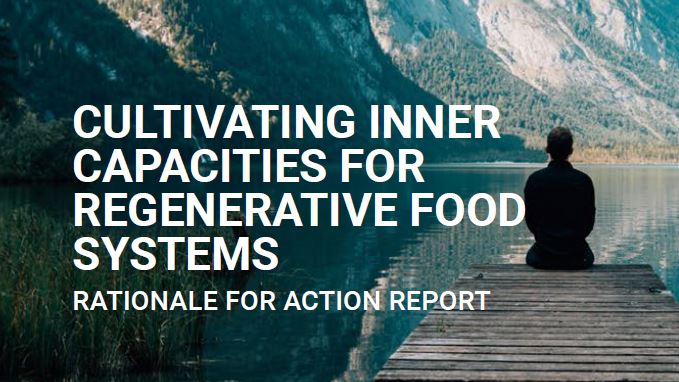
October was an important month for food. For instance, “World Food Day” was celebrated on October 16 with the theme of “Leave No One Behind,” which highlighted the need to build a more sustainable world and ensure people have access to enough nutritious food. Our partners Regeneration International hosted the People’s Food Summit with speakers like Vandana Shiva. And most notably, the United Nations Development Programme’s (UNDP) Conscious Food Systems Alliance published, Cultivating Inner Capacities for Regenerative Food Systems: Rationale for Action Report featuring Shumei.
This breakthrough report presents how mindfulness, connection to nature, and consciousness approaches play a crucial role in regenerative food movements transforming our food system. Through various case studies and approaches, the CoFSA report provides a rationale for cultivating inner capacities as a crucial complementary approach to transforming our food systems. Within the report, evidence for the potential of conscious approaches to unlock food systems transformation was presented alongside case studies.
Shumei was mentioned in the examples of regenerative food movements building on distinctive inner capacities. It was recognized that there is a global movement of farmers, scientists, chefs, creative individuals and consumers practicing Shumei Natural Agriculture, promoting ecologically friendly and sustainable farming practices in local communities around the world based on a philosophy of reverence and understanding of the natural world.
In honor of this ‘food’ month, it is important to emphasize that billions of people around the world are unable to afford a healthy diet, face food insecurity and malnutrition, and access to nutritious food has been limited due to multiple challenges including the COVID-19 pandemic, climate change, rising prices, and inequity. Worldwide, more than 80% of those who live in extreme poverty live in rural areas, rely on agriculture and natural resources. This population is usually hit the hardest by natural disasters and face discrimination because of gender or status.
This is why government leaders, academia, civil society and beyond must work together to prioritize that all people have access and the right to food, nutrition, and equity. Through collaboration, we are able to work towards an inclusive and sustainable future.
At Shumei, this is at the heart of our work and we are honored that the UNDP CoFSA has put a spotlight on how important one’s mindset is in achieving these goals. We need a shift in mindset and consciousness to activate the food systems transformation needed to promote ecological approaches to food production, reinforce biodiversity and seed sovereignty, and renew people’s relationship with food and nature – to not treat nature as a commodity to be controlled.
Through our Natural Agriculture projects in areas like Africa, Asia, and South America, we are supporting small-holder farmers to produce real, nutritious food without the use of chemicals and fertilizers. Additionally, we are educating local communities about the importance of saving indigenous seeds in order to increase the local environment’s resilience to climate change and to create lasting food supplies for families and the community. Lastly, through Natural Agriculture, we hope it will encourage farmers to make everyday choices that promote harmony within nature.

